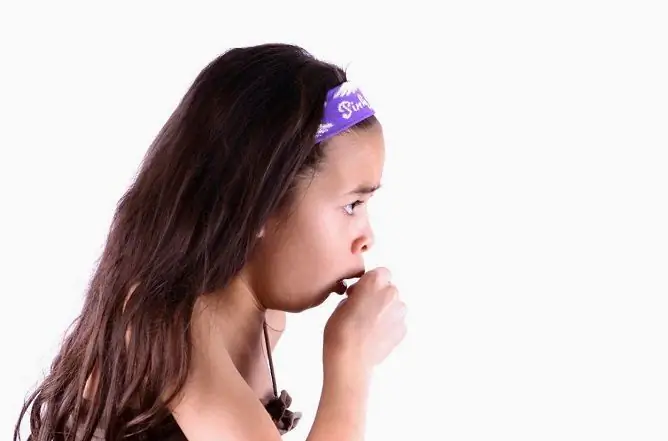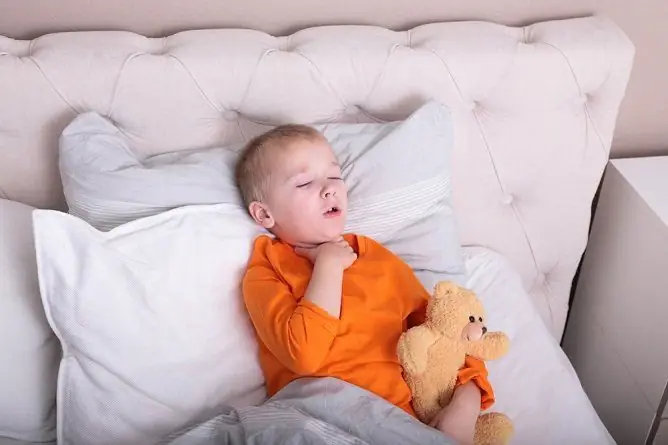- Author Rachel Wainwright wainwright@abchealthonline.com.
- Public 2024-01-15 19:51.
- Last modified 2025-11-02 20:14.
Dry cough in a child at night: reasons how to help
The content of the article:
-
Features of nocturnal dry cough
- Diseases of the nose and paranasal sinuses
- Adenoids and adenoiditis
- Acute laryngotracheitis
- Whooping cough
- Gastroesophageal reflux disease
- First aid for an attack
-
Treatment tactics
- Specific treatment
- General recommendations
- Inhalation
- Drug treatment
- Video
A dry cough in a child at night can appear for various reasons. Such a cough tires the baby, does not allow him or his parents to sleep. A strong and persistent cough harms the body and therefore requires treatment. However, before treating a cough, you need to understand why it occurs.

A dry nighttime cough is not always dangerous, but it interferes with the normal sleep of the child and is therefore undesirable
Features of nocturnal dry cough
Cough has a protective function, helping to clear the airways of dust, viruses and bacteria. An important role in the elimination of foreign substances is played by bronchial mucus - sputum. With a dry cough, sputum is not released. If the cough is dry, the physiological cleaning function is not performed. A nighttime cough is harmful to the child, tiresome, interferes with sleep and rest.
The appearance of coughing fits at night has several explanations:
- At night, the parasympathetic nervous system is activated, in particular the vagus nerve, which triggers the cough reflex.
- Activation of the vagus nerve leads to increased secretion of gastric juice. In the horizontal position, the likelihood of acidic contents entering the respiratory tract increases.
- At night, in a horizontal position, mucus, which is produced in the upper respiratory tract, flows down and accumulates in the throat.
- If a child has a stuffy nose, he breathes through his mouth at night. This leads to dryness of the mucous membrane and activation of the cough reflex.
- Coughing is more difficult at night than during the day. Because of the cough, the child does not sleep well, cannot recover.
Causes of dry cough at night in children
Night cough is not a specific symptom; it can occur with various diseases. The cause of dry cough in children can be inflammation of the upper respiratory tract, childhood infections, and even extrapulmonary pathology.
Diseases of the nose and paranasal sinuses
Rhinitis and sinusitis are a common cause of cough in children. Aggravation occurs at night if the child breathes through the mouth. You can suspect rhinitis and sinusitis in a child by the following symptoms:
- nasal congestion;
- mucous discharge from the nose;
- headache;
- subfebrile body temperature.
The most common cause is infection (bacteria and viruses) and allergies.
Adenoids and adenoiditis
A common cause of dry cough in preschool children is adenoids and adenoiditis. Adenoids are hypertrophy of the nasopharyngeal tonsil, and adenoiditis is its inflammation.
Cough with adenoids without phlegm, it is accompanied by other symptoms:
- nasal voice;
- nasal congestion;
- half-open mouth;
- snoring, sleep apnea syndrome.
With adenoiditis, the production of mucus in the tonsil increases. It flows down the back of the pharynx and provokes a cough. The attacks are especially strong at night, since the child does not swallow mucus, so it accumulates in the throat. If the child is given water to drink, the attack will decrease.
Acute laryngotracheitis
With acute laryngotoacheitis, the cough can also get worse at night. In addition, there will be other symptoms:
- difficulty breathing;
- hoarse voice.
If it becomes difficult for a child to breathe against the background of a cough, it is necessary to immediately seek medical help. This may indicate laryngeal edema.
Whooping cough
Whooping cough is a bacterial infection that primarily affects children. With whooping cough, the cough is specific:
- intensive;
- paroxysmal;
- frequent (more than 15-25 attacks per day);
- may result in vomiting.
With whooping cough, attacks occur during the day, but are aggravated precisely at night.
Whooping cough is a dangerous disease, at the first signs of the disease you need to see a doctor.

Whooping cough is a bacterial disease that requires antibiotic therapy
Gastroesophageal reflux disease
In gastroesophageal reflux disease (GERD), coughing at night occurs when gastric contents are released into the airways. In an upright position, the symptom may be completely absent.
With GERD, gastric symptoms come to the fore:
- heartburn;
- sour belching;
- pain and burning sensation behind the breastbone.
The disease manifests itself in older children, babies rarely get sick.
First aid for an attack
If a child has a nocturnal cough that appears as seizures, the first thing to do is to soften and stop the cough. How can you help your child:
- Give a warm drink. You can give your child warm tea, milk with honey, and still mineral water. This will soften the cough, ease the child's condition.
- Calm down. If the child is small, pick it up and swing it.
- An older child may be given a local anesthetic lollipop or peppermint to suck.
Treatment tactics
Treatment of dry cough in a child has several directions: getting rid of the cause, mitigating attacks, moisturizing the mucous membranes. To do this, use medications, inhalations, medicinal plants.
Specific treatment
Cough is not an independent disease, but only a symptom of any disease. You need to treat the disease, if you get rid of the cause, the cough will also pass. The methods of therapy depend on the underlying disease.
| Disease | Specific treatment |
| Inflammation of the nose and paranasal sinuses | For bacterial infections, antibiotics are prescribed. |
| Adenoids |
Complex treatment: • rinsing the nose and nasopharynx; • gargling; • local decongestants (Nazivin); • systemic drugs (Sinupret). |
| Adenoiditis | Treatment is aimed at removing mucus and debridement. Rinsing is applied, if necessary, antibiotics. If indicated, surgery (adenotomy) is performed. |
| Whooping cough | Antibacterial agents from the macrolide group - Azithromycin. |
| Acute laryngotracheitis |
Treatment is aimed at reducing swelling: • glucocorticoids (Prednisolone, Dexamethasone); • Pentoxifylline; • antihistamines (Suprastin, Diphenhydramine). |
| Obstructive bronchitis | Inhaled bronchodilators, in severe cases, glucocorticoids. |
| GERD |
Complex therapy aimed at reducing the acidity of gastric juice: • antisecretory drugs: proton pump inhibitors (Omeprazole) and histamine blockers (Famotidine). Proton pump inhibitors are only prescribed for children over 12 years of age; • antacids: Almagel, Maalox. With a hernia of the esophageal opening of the diaphragm, surgical intervention is indicated. |
General recommendations
You can reduce the intensity of attacks by observing the following guidelines:
- Humidify the air in the baby's room. You can use a special humidifier. If not, place containers of water around the room.
- Give your child plenty of fluids throughout the day.
- Feed in small portions, exclude irritating foods from the diet.
- Maintain a comfortable temperature in the room, cold air provokes a cough.
Adhering to these rules, you can alleviate the condition of the child, reduce the frequency of nocturnal attacks.

Drinking plenty of fluids can help relieve dry cough attacks
Inhalation
Inhalations are effective for dry coughs, as they relieve airway spasms, moisturize the mucous membranes of the respiratory tract, and reduce swelling and inflammation. At home, the following types of inhalations are used:
- Steam inhalation. For their implementation, medicinal herbs, mineral water, water with soda are used. Among the medicinal plants are chamomile, eucalyptus, mint, St. John's wort, marshmallow. A decoction for inhalation is prepared at the rate of 1 tbsp. plants in 1 glass of water. The liquid is heated to a temperature of 50 ° C. The solution is poured into a container and cover the baby's head with a towel. It is contraindicated to use steam inhalations with an increase in body temperature, a tendency to allergies, for children under 7 years old.
- Warm inhalation with essential oils. The water temperature can be lower than with steam inhalation - 30-40 ° C. Warm inhalations are safer as they do not cause burns. Essential oils of eucalyptus, pine, sea buckthorn are used. For 1 liter of water you need 3-4 drops of essential oil. Contraindicated in small children, as well as in children prone to allergies.
- Inhalation with a nebulizer. The most effective type of inhalation. A nebulizer is a special device that can deliver a drug even to the lower respiratory tract. For inhalation with a nebulizer, physiological solution, slightly alkaline mineral waters are suitable.
Inhalation is a simple procedure that can be used at home. But even inhalation can be harmful if you do not adhere to certain rules:
- The duration of the procedure is 3-4 minutes.
- Do not breathe over boiling water, as this can burn the respiratory tract.
- With diseases of the nasal cavity, you need to breathe through the nose, with pathology of the pharynx, larynx, trachea - with the mouth;
- The frequency of repetition of inhalations is 2-5 times a day (prescribed by a doctor).
Inhalation should not be uncomfortable.
Drug treatment
Drug treatment for dry cough includes two main groups of drugs: antitussive and enveloping. With a painful cough, which is accompanied by vomiting and disrupts the child's sleep, the use of antitussive drugs is indicated. Coating preparations are softer, they are indicated for severe irritation of the mucous membrane.
| Antitussive drugs | Coating preparations | ||
| Central narcotic | Central non-narcotic | Peripheral | |
| Suppress the cough center located in the medulla oblongata. In children, they are used extremely rarely, as they can depress respiration and be addictive. |
Affects the cough center but is not addictive. They are used carefully, only after consulting a doctor. Contraindicated in children under 3 years of age. This group includes Butamirate, Glaucin, Oxeladin. |
Reduce the sensitivity of cough receptors located in the airways. They are not addictive and do not depress breathing. This group includes Libexin and Lidocaine. |
Shown at cough that occurs due to irritation of the mucous membrane of the upper respiratory tract. The drugs create a protective layer on the mucous membrane membrane of the pharynx. These drugs include: Herbion syrup; Rubital forte. |
Video
We offer for viewing a video on the topic of the article.

Anna Kozlova Medical journalist About the author
Education: Rostov State Medical University, specialty "General Medicine".
Found a mistake in the text? Select it and press Ctrl + Enter.






